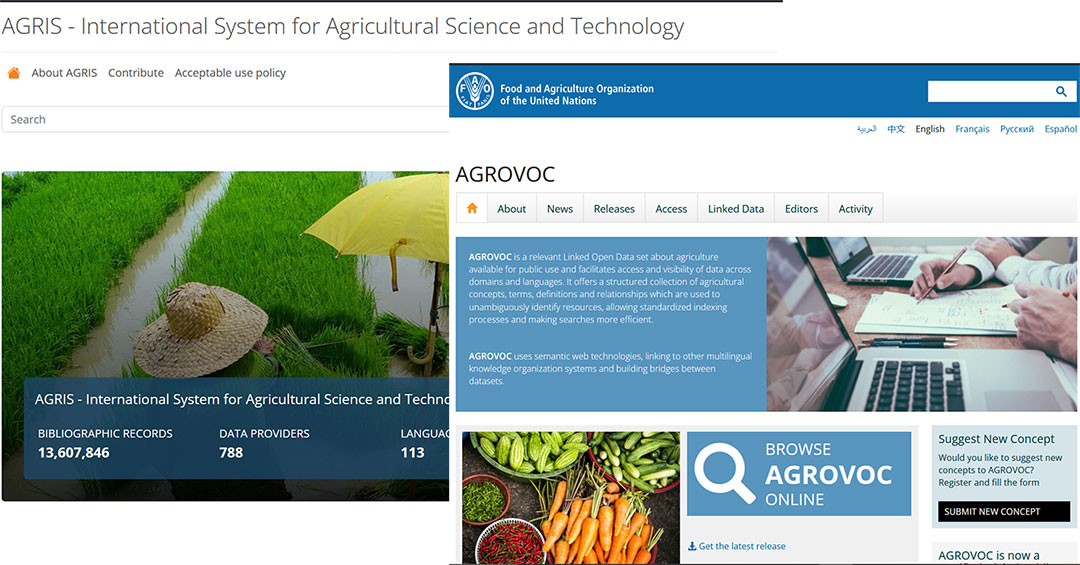Source: ICARDA

In a recent series of conversations with CGIAR Knowledge Management teams, Sara Jani and Valentina De Col from ICARDA interviewed members of IITA’s knowledge management team, Olayemi Oluwasoga, Open Data Engagement Manager, and Olawamiwa Adeoluwa, Data Analyst and Archival Specialist. They explored CGIAR’s collaboration with the Food and Agriculture Organization of the United Nations (FAO) on AGRIS and AGROVOC. AGRIS is a comprehensive bibliographic database focused on agriculture and nutrition, while AGROVOC is a multilingual thesaurus covering a wide range of agricultural terms.

Olayemi Oluwasoga, Open Data Engagement Manager
Benefits of being in AGRIS
Q: IITA has shared its knowledge products with AGRIS and plans to do so more. What benefits do you see in being part of AGRIS?
Olayemi: Since we began sharing our data with AGRIS, we have observed a significant increase in traffic to our data repository, which has enhanced visibility and increased citations for our researchers. The partnership has elevated the global recognition of our data, attracting attention not only from within Africa, where our work is centered, but also from Europe and the Americas. Another key benefit has been the improvement in metadata extraction and standardization, which has streamlined our data management processes.
Olawamiwa: Building on Olayemi’s points, AGRIS has increased the visibility of our research by positioning it on global platforms. This exposure allows agricultural researchers from various communities of practice to engage with our work. Consequently, our research has seen wider dissemination, which enhances its citation potential. AGRIS also provides improved access to our extensive repository of agricultural research, making it more accessible to a global audience.
Importance for CGIAR to share research outputs via AGRIS
Q: From a broader perspective, do you think it is important for CGIAR to share its research outputs with a larger community and global users through AGRIS?
Olayemi: Absolutely, sharing research through AGRIS is essential. Research is meant to be accessible and used by the global community to drive agricultural development and innovation. AGRIS helps make research outputs, best practices, and solutions more visible and impactful. This visibility not only helps identify research gaps but can also drive funding opportunities.
Olawamiwa: AGRIS is critical in fostering international collaboration by supporting comprehensive, multidisciplinary studies. It also serves as a means of sharing knowledge with experts in the same fields and a wider scientific community. It aids evidence-based policymaking at both local and global levels, which is crucial for effective decision-making and the formulation of agricultural policies.
The knowledge content from IITA: types of content and subjects
Q: How would you describe the knowledge products produced and available from your center through your repository? What specific research areas does IITA cover?
Olawamiwa: Our knowledge products encompass various thematic areas, including socioeconomics, natural resources, genetics, biotechnology, agribusiness. IITA’s collection in CGSpace represents a rich foundation of knowledge, providing access to empirical data and observations from extensive scientific research.
Olayemi: We produce various materials such as research articles, technical reports, theses, datasets, and multimedia content. Notably, over 70% of our publications are open access, which ensures they reach a broad audience and contribute to global knowledge dissemination.
Importance of AGRIS for agricultural research institutions such as CGIAR
Q: Do you believe it is important for agricultural research institutions and networks, like CGIAR, to have access to a comprehensive bibliographic database like AGRIS? What specific benefits do you see?
Olayemi: Access to AGRIS is crucial for agricultural research institutions. Our engagement with AGRIS has enhanced data quality, improved metadata management, and increased visibility. This access is fundamental in strengthening the impact and reach of our research.
Olawamiwa: AGRIS provides global recognition and supports comprehensive research by offering diverse perspectives and insights into agricultural issues. It also fosters networking opportunities and helps identify research gaps, guiding future studies and enhancing research efforts.
Enhancing findability and interoperability through AGROVOC
Q: CGIAR also contributes to and uses AGROVOC as a common vocabulary. How does this collaboration enhance the findability and interoperability of your data?
Olayemi: AGROVOC significantly enhances the visibility and searchability of our data. By using standardized keywords, users can easily locate relevant information. An area for improvement would be to enrich AGROVOC terms, particularly in socioeconomic data, to enhance data findability further.
Olawamiwa: Being part of the AGROVOC Curation Team has improved our data management by employing standardized terminologies and ontologies. This consistency reduces ambiguity and enhances clarity, making it easier for researchers to describe their work and retrieve accurate information. Although standardizing metadata remains challenging, collaboration with AGROVOC aligns our data management practices with global standards.
This conversation highlights the benefits of collaborating with AGRIS and using AGROVOC. This collaboration not only boosts the visibility, accessibility, and citation of agricultural research outputs but also strengthens global recognition and impact, enabling CGIAR centers like IITA to manage data more efficiently while promoting multidisciplinary knowledge sharing across the international agricultural research community.
For more info on the CGIAR and FAO collaboration:
Report: https://hdl.handle.net/10568/116236


No Comments